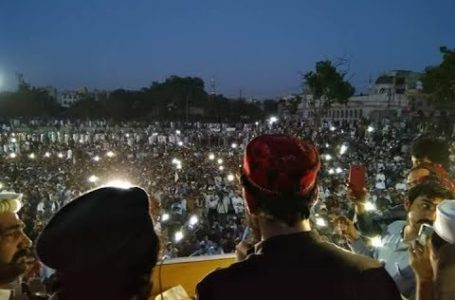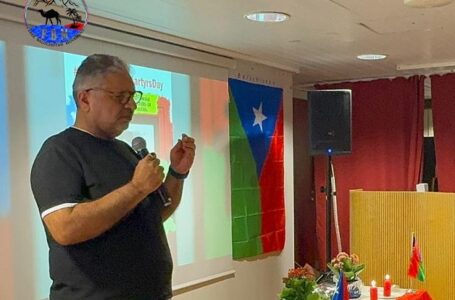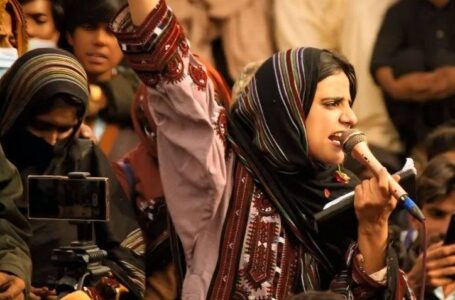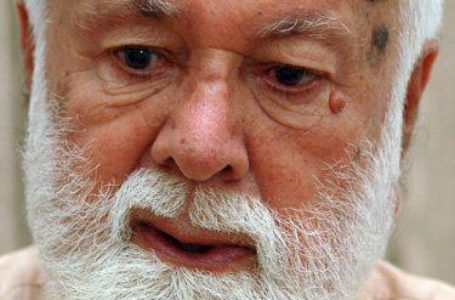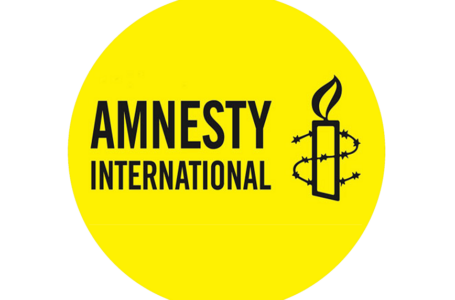Occupied Balochistan: A Chronicle of Genocide, Exploitation, and Resistance
Tens Of Thousands Rally For Rights Of Ethnic Pashtuns In Pakistan
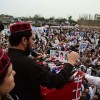
PESHAWAR, Pakistan — Tens of thousands of ethnic Pashtuns — led by young the young activist Manzoor Pashteen — gathered in Pakistan’s northwestern city of Peshawar on April 8 for a mass demonstration to demand the protection of the rights of Pashtuns.
RFE/RL’s Radio Mashaal correspondents say as many as 60,000 people took part in the gathering, despite a media blackout in much of the country on reports about the demonstration.
The Pashtun Tahafuz Movement (PTM), or Pashtun Protection Movement, was started mainly by young Pashtun activists who are demanding an end to what they say are human rights violations by authorities in the country’s tribal regions.
They have been calling for the removal of military checkpoints in tribal areas and an end to “enforced disappearances” in which suspects are detained by security forces without due process.
Pashteen, the founder leader of the PTM, told the gathering on April 8 that Pakistan’s government needs to form a judicial commission to investigate alleged extra-judicial killings in Pashtun-dominated regions of Pakistan.
He said police and security officials must bring before the courts all Pashtuns who have been detained and listed by authorities as “missing.”
If found not guilty of allegations against them, Pashteen said, authorities must free detained suspects.
Pashteen also said Pakistan’s government needs to clear landmines from the war-torn tribal regions along the border with Afghanistan.
Hundreds of women and children were among the participants in the April 8 demonstration, with some addressing the gathering
One woman who spoke to the rally, Basro Bibi from the Khyber tribal area, said her husband has been listed for several years by authorities as “missing.”
She accused Pakistan’s powerful Inter-Service Intelligence (ISI) agency of being behind his disappearance and many other “enforced disappearances” in the tribal regions.
Missing Relatives
Hundreds of other people attending the rally held photographs of their missing relatives, including captions with their names and the dates they went missing.
Two left-wing Pakistani political parties, Pakhtunkhwa Milli Awami Party and Balochistan’s National Awami Party, took part in the April 8 demonstration. But prominent leaders of other Pashtun nationalist and religious parties did not participate, despite vows in February that they would give their full support to the PTM.
Pakistan’s government rejects allegations that security forces or its intelligence service is responsible for enforced disappearances.
Authorities say military checkpoints are necessary in the tribal areas in order to combat Islamic extremist militants, including Pakistani and Afghan Taliban fighters.
The Pashtun Tahafuz Movement first staged a 10-day sit-in protest in Islamabad in February in response to the January killing of 27-year old Naqeebullah Mehsud during what Pakistani police described as a raid on a “terrorist hideout” in eastern Karachi.
Pakistani police claimed Mehsud was a member of the Pakistani Taliban.
‘Encounter Killing’
Mehsud’s relatives in his native South Waziristan, where he was buried, deny that he was a militant.
They claimed he was the victim of an “encounter killing” — a situation where police allegedly carry out an extrajudicial killing because they do not have enough evidence to convict a suspect in court.
The PTM halted its first Islamabad sit-in protest in mid-February after the government provided written assurances that it would address the group’s complaints.
But the PTM relaunched demonstrations in March, saying it was dissatisfied with the government’s progress toward keeping its promises.
Meanwhile, the PTM appears to have been gaining popular support in the tribal regions and in Pakistan’s northwestern Khyber-Pakhtunkhwa Province with continued calls for an end to what it describes as the “persecution” of ethnic Pashtuns.
Rights groups also have said so-called “encounter killings” are common in Pakistan.
The Human Rights Commission of Pakistan (HCRP), an independent rights organization in Islamabad, says Pakistani police reports listed the killing of at least 318 suspects during raids and shootouts in Karachi during 2016.
The PTM says it is simply demanding the rights that Pakistani citizens are meant to be guaranteed under Pakistan’s constitution.
Similar demonstrations in solidarity with the PTM protest were held on April 8 in Germany, Sweden, Australia, London, Washington and Afghanistan.
Source: Radio Mashaal


